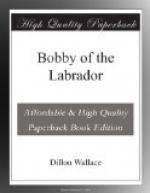The two men were leaning eagerly forward during this recital. When Bobby had finished they sat back and looked into each other’s eyes, and after a moment Mr. Winslow spoke:
“There is no doubt, Edward, that Skipper Ed is your uncle—your father’s brother who disappeared so long ago, when you were a baby.”
“Yes,” agreed Edward, “and we must go to him and take him home again.”
“You—don’t—mean—you’re Skipper Ed’s people?” stammered the astonished Bobby.
“Yes,” said Mr. Winslow, “Edward’s father and Skipper Ed were, I believe from what you have told us, brothers, and in that case Mrs. Winslow is Skipper Ed’s sister. She was a little girl when he went away. We must look into the matter, and we shall all be very glad if it proves to be true.”
And then they talked for a long while, and drew from Bobby the story of their life at Abel’s Bay—of how Skipper Ed had taught him and Jimmy, and the evenings spent in talking and studying in the easy chairs before the big box stove in Skipper Ed’s cabin, and about Abel Zachariah and Mrs. Abel—so much, in fact, about their daily lives and hopes and disappointments that presently his two hearers felt that they had known Bobby and his friends all their life.
And Bobby told them the story of his own coming to the Coast, as he had heard it from Abel and Mrs. Abel many a time, of how he had been found drifting in a boat with a dead man, of the grave Abel had made on Itigailit Island for his dead companion, and the cairn he himself had built.
“We have the boat yet,” said Bobby, “for it was a good boat. Father has always taken great care of it. He and Mother always say it’s the boat God sent me in out of the mists from the far beyond, where storms are born.”
“What a romantic life you’ve led!” said Edward. “Your very advent upon the Coast was romantic—and tragic. And the way we found you today is no less so.”
“Have you no clue that would help you identify yourself? No clue as to where you came from? Was there nothing to identify the dead man?” asked Mr. Winslow.
“No,” answered Bobby, “and I’ve never thought about it very much. Mother has the clothes I wore, wrapped in a bundle and stowed into a chest. I’ve often seen the bundle, but I never undid it or meddled with it for she prizes it so.”
“It was probably a boat from a whaling or fishing ship that was wrecked,” Mr. Winslow suggested. “Perhaps you were the captain’s son. You should look into the bundle; it may help to identify you, and you may have relatives living, perhaps in Newfoundland, who would be glad to know of you.”
For two weeks the Fearless, which was the ship upon which Mr. Winslow and his nephew were passengers, remained near the ice, her crew of nearly two hundred men engaged in killing seals and in loading them aboard, and then at last, with a cargo of nearly forty thousand carcasses, she set sail to the southward.




